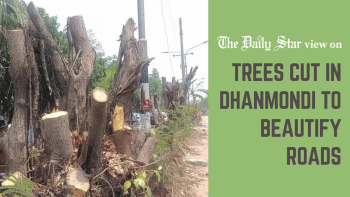More trees fall victim to development

Despite repeated protests and warnings by experts, the onslaught on our trees shows no sign of ending, all for the sake of "development." In continuation of this trend, nearly a 100 trees on Jahangirnagar University (JU) campus have been cut down to build new academic buildings, as reported by this daily. We are disturbed to see the authorities continuing to neglect nature at a time when the country is reeling from extreme environmental crises, such as rampant pollution and rising temperatures.
The site, named "Sundarban" by the students for its abundance of trees, is set to see the construction of classrooms and seating space for teachers, as there is a shortage of these facilities, according to the director of JU's Institute of Business Administration (IBA), which felled the trees. Like always, the blame game is in full force. JU's deputy registrar claimed that IBA did not take any permission to cut trees, and they were not aware of the matter. In reply, the IBA director claimed they didn't need any permission, and shifted blame to the construction company.
This is not the first time the lush green campus, with thriving habitats for all kinds of animals, has faced such a crisis—as just last year, many trees were felled to construct a playground. In 2019, the administration decided to cut a staggering 1,100 trees to make space for new dormitories. Thankfully, through the students' efforts to protect the environment, JU abandoned this plan and selected an alternative space for construction. In fact, this battle between the students and authorities over JU's greenery has been a long-standing one. But the authorities seem steadfast in their short-sighted ways, judging by their latest action.
All this leaves us with one question: why are authorities so adamant to cut down our trees despite the far-reaching consequences? While experts constantly emphasise the need for sustainable development, this advice seems to fall on deaf ears. With the looming danger of the climate crisis, it is imperative that the JU administration think long-term and not only focus on developing infrastructure by sacrificing greenery. Surely, a university, if it so wants, can ensure architecture that protects and enhances the greenery around it.


 For all latest news, follow The Daily Star's Google News channel.
For all latest news, follow The Daily Star's Google News channel. 










Comments